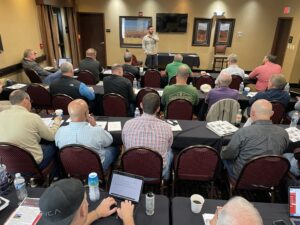
IN THE MIDDLE EAST (BP)–With a schedule that demands 30 hours a week of language school, 15 hours a week making friends with local unbelievers and countless hours keeping up with their children in a foreign country, these wives prioritize their time — and trust God — amid their tremendous responsibilities.
Candie Lewis*, mother of two young children, serves in Central Asia alongside her husband who is enrolled in Southeastern Baptist Theological Seminary’s “two-plus-two” missions degree program.
Wives and mothers — wherever they are stationed — need to remember that their main priority is to honor God as a wife and mother and bring glory to God within their own home, Lewis said.
“It is easy to put all your energy into language studies and working outside your home. However, my first priority is being a wife and mother.”
Natalie Crane serves with her husband in Central Asia and has twin toddlers to keep up with.
Since being on the field, it has become difficult to balance the required language studies with raising twins, Crane said, so she decided to make adjustments in her busy schedule.
“I didn’t want my children to prefer going home with their nanny instead of me every night because she sees them more, so I decided to take fewer language classes,” Crane said.
Wives living and ministering overseas find that even everyday tasks like grocery shopping take far more work than in America.
Women must shop in an open-air market and roam store to store for each item on their grocery list. An average shopping trip means stopping at 15 to 20 small shops. Shopping carts, clean grocery stores and helpful aides are simply not available to most women.
“There is no such thing as an American grocery store,” Lewis said.
Crane said her shopping experiences are more like “hunting and gathering. There is always a mass of people in the market, and it is impossible to roll a double stroller down the market.”
Lewis agreed. “I can barely carry my shopping bags when I am shopping, much less my two toddlers,” she said.
Most wives must shop five days a week because everything they buy is fresh.
“Where we live, there is no such thing as a quick meal,” Crane said. “Everything must be made from scratch. We don’t just open a jar of spaghetti sauce. There’s no Prego here.”
Between raising toddlers in a foreign country, four to eight hours of language study every night, and the necessity to make meals from scratch, the average mother finds herself leaning on God to give her the energy to do it all again the next day.
Even so, Crane and Lewis agreed they love having their children with them while serving overseas with their husbands.
“They are certainly a bridge to getting to know the people,” Crane said. “I wouldn’t know the people I know had it not been for my babies. They like to tell you about their baby customs, and they relate to us like a normal family. We become more approachable and less intimidating because we have babies.”
Norah Hopkins, who serves with her husband in Southeast Asia, had her first child while serving on the field several months ago.
Having her baby boy was no easy venture, but his birth helped build a bridge to her people group, Hopkins said.
“They love to say that he is their baby,” Hopkins said. “They say he will learn to speak their language. They just love it.
“It is sweet to see how the older ladies want to teach you the right way to care for your baby. All the nationals seem to want to tell you how to raise a baby their way.”
Lewis said she trusts God to give her the strength to take the next step on the mission journey — a journey she and women just like her across the globe say they would never trade for anything. “Figure out what your priorities are,” she counseled, “and be willing to stand up for them.”
–30–
Names and locations have been changed to protect missionaries working in restricted-access countries.















